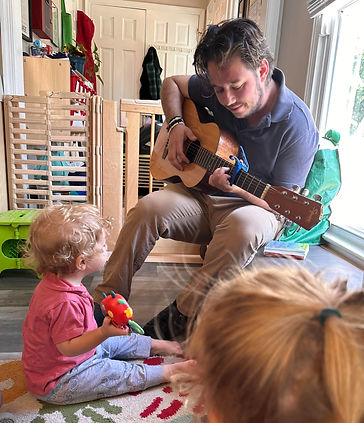
Early Childhood Music Classes
What to expect:
Classes will be led by Andy McGeagh, a certified Infant and Early Childhood Music Education Specialist from Greensboro, NC. Parents can expect to join their child in interactive activities like singing, movement, and instrument play, fostering musical skills and overall cognitive development. Together, families will incorporate age-appropriate concepts to promote creativity, social interaction, and cognitive growth. Children will enjoy joyful musical experiences while developing a lifelong love for music and strengthening the parent-child bond through shared music experiences.
Why invest in Early Childhood Music?
Edwin Gordon's Music Learning Theory
Meet Edwin Gordon, a pioneering figure in music education renowned for his groundbreaking contributions to the field. As a distinguished researcher and educator, Gordon's innovative Music Learning Theory has revolutionized how we understand and teach music. His work has left an indelible mark on the history of music education, shaping the way we approach musical learning and development. Some of his main focuses included, music aptitude, audiation, and sequenced instruction.
Music Aptitude:
In Edwin Gordon's Music Learning Theory (MLT), music aptitude refers to an individual's inherent capacity to understand and engage with music. Gordon conceptualizes music aptitude as a multifaceted construct encompassing various musical abilities, including tonal and rhythm aptitudes. Tonal aptitude pertains to the ability to perceive and reproduce pitch relationships, while rhythm aptitude relates to the capacity to perceive and reproduce rhythmic patterns. According to MLT, individuals possess varying levels of music aptitude, which can influence their musical learning and development. Music aptitude is not fixed but can be nurtured and developed through systematic music instruction and exposure to rich musical experiences. By understanding and assessing students' music aptitudes, educators can tailor their teaching approaches to meet the unique learning needs and strengths of each individual, fostering a supportive and inclusive musical learning environment.
Audiation:
Audiation lies at the heart of Gordon's concepts, representing the ability to mentally comprehend and internally hear music without the presence of external stimuli. Audiation is akin to the process of thinking in music, where individuals imagine and understand musical sounds, structures, and patterns within their minds. According to Gordon, audiation is not limited to simply hearing music in one's head but encompasses a deeper level of musical understanding and cognition. It is through audiation that individuals develop aural skills, musical memory, and the ability to interpret and express music fluently. Gordon posits that audiation serves as the foundation for musical development, providing the basis for learning and internalizing musical concepts and skills at all stages of musical growth. Thus, by fostering audiation through systematic exposure to rich musical experiences and activities, educators can help students develop a deep and intuitive understanding of music, enabling them to engage with music fluently and creatively throughout their lives.
Sequenced instruction:
At the core of Edwin Gordon's pioneering Music Learning Theory lies sequenced instruction, which provides a structured framework for musical development. Gordon's research emphasizes the importance of systematically exposing learners to a sequence of tonal and rhythm patterns, starting from infancy and progressing through various stages of musical understanding. By introducing patterns in a logical and sequential manner, educators can scaffold students' learning, facilitating the internalization of musical concepts and skills. This approach ensures that learners build a solid foundation of musical understanding before progressing to more complex concepts. Through sequenced instruction, Gordon provides a roadmap for educators to nurture musical growth and proficiency in learners of all ages and abilities.





Rates:
Please contact me to inquire about hosting classes. Rates will depend on location and we will work together to develop a payment plan that works well for everyone.
The cocurricular power of music!
Engaging in musical pursuits alongside traditional studies enriches students' educational experiences and fosters holistic development.